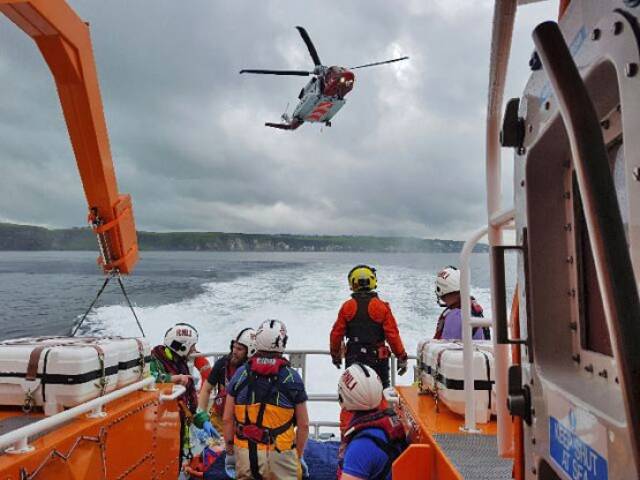#RNLI - It was another busy day for North Coast lifeboat volunteer crews as both Portrush RNLI lifeboats were launched for the second time in 24 hours yesterday evening (Sunday 24 July).
The all-weather and inshore lifeboats were launched at 5.30pm to reports of a casualty who had fallen onto rocks inside a cave just underneath Dunluce Castle.
Weather conditions were good with a calm sea and little wind which helped the lifeboats to reach the scene in good time. Rescue 999, the helicopter from Prestwick, was also tasked to airlift the casualty to hospital.
The Portrush inshore lifeboat (ILB), carrying a paramedic from the NI Ambulance Service, had to get as close to the shoreline as possible to recover the casualty.
Meanwhile, the all-weather boat (ALB) was waiting alongside to transfer the casualty so that the helicopter could carry out an airlift from the bigger boat.
"This operation took skill and precision and is something that lifeboat and rescue helicopter crews practice on a regular basis," said Portrush RNLI lifeboat operations manager Robin Cardwell.
"This was a textbook callout carried out with absolute precision by all involved. We hope that the casualty makes a full recovery."
Less than 24 hours previously on Saturday evening (23 July) both lifeboats were called out to reports of swimmers who were missing off the coast between Castlerock and Downhill.
Within minutes both lifeboats were on scene along with RNLI beach lifeguards on their rescue water craft. The Irish Coast Guard's Sligo-based helicopter Rescue 118 was also tasked.
The waters between the two land points were thoroughly searched with no swimmers being found. The search was stood down around 9.15pm and described as a ‘false alarm with good intent’.
Two other joint operations on the North Coast occurred earlier in the week, the first to reports of two surfers believed missing at Benone Strand on Tuesday (19 July).
Portrush's inshore lifeboat was requested by the lifeguards to assist in the search, though thankfully the surfers turned up safe and well.
The second callout on the same day around 4pm was to reports of a lost child at White Rocks beach. The coastguard and lifeguards searched the beach while the inshore lifeboat patrolled the sea just off shore. The child was found safe and well by the lifeguards.
More recently, the lifeguards themselves sprang into action on Saturday afternoon at Benone to assist a child who had been stung by a weever fish.
As part of their training the lifeguards undertake a comprehensive first aid course which equips them to deal with most situations they may encounter on a busy beach in the summer.
RNLI volunteer lifeguard press officer Liam Mullan reminded beachgoers to "always try to visit a RNLI lifeguarded beach. Remember to keep an eye on the flags and swim between the red and yellow flags.
"If you get into difficulty raise your hand and call for help. If you see someone in difficulty dial 999 and ask for the coastguard."































































